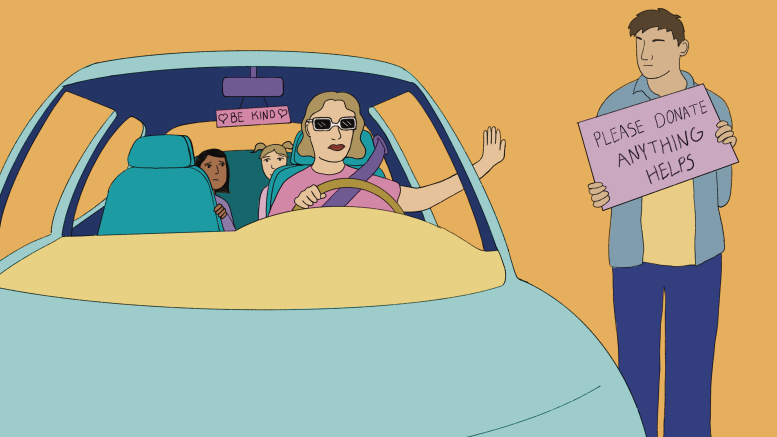When I heard about atrocities happening in the world, I would look around at my community taking wonderful actions and feel proud to be Canadian. As a kid, I believed little acts of kindness would coalesce to save our world.
Now I am not so certain.
I grew up in spaces where people were more well-off than I was. But I was never made to feel like it. Even when kids were not nice to me, adults were. They strived to be helpful, offered immense praise and acted courteously to a fault.
This kindness manifested in many ways, but it was recurrent when it came to rides. With shift work and multiple jobs, my parents were rarely available to drive me to activities. Thankfully, neighbours were happy to take me to gurdwara — a Sikh place of worship, teammates and coaches volunteered to carpool before I could ask and strangers would pause at bus stops during days with poor weather.
I grew up in areas where I trusted that strangers were people with good nature and warm hearts. Even before I understood English, my kindergarten classmate whose name I could hardly pronounce — and who could barely pronounce my name — gave my mom and I rides during formidable snowstorms.
I use cars as an example of kindness because they are a capitalist hellscape, yet the good people around me converted them into genuine vehicles for connection and community. Despite traffic, carsickness and construction, some of my favourite memories with my favourite people happened in cars.
With the kindness I was shown, I predictably became, well, a kind person. I love to drive people around, so I do it often. I happily carry the mantle of overly polite Canadian by acting friendly and saying sorry a lot.
But the aspect not entrenched in my Canadian upbringing was radical kindness.
The United Kingdom’s Belong Network defines radical kindness as “acts and activities that intentionally seek to build bridges across differences, develop solidarity and shared ground and promote social connection between different groups and communities.” It addresses root “structural and institutional barriers” and is distinct from “situational, random or relational acts of kindness.”
Radical kindness is unconditional, yet the kindness in my life had always been conditional. Strangers who were quick to help me failed to respect homeless people sleeping in bus shelters. The teammates, liberal with their rides, were the first to make jokes at the expense of gay people. And the generous neighbours driving me to gurdwara promoted racist ideologies about Indigenous peoples.
Luckily, I met the conditions for the kindness I received. I offset my brown identity with my Canadian upbringing. Thus, I fit in and thrived in my predominantly white community. But it is nauseating to consider those who cannot do that with their identities and do not receive the grace that they deserve. Winnipeg is a place where it takes minutes for someone to tell me about my defective headlight. Yet it can take hours for someone to give a dime to a homeless person.
Community becomes a sorority if we only offer it to those who are like us. Community cannot survive without the glue of radical kindness.
Hence, the comfort I used to find in disconnected acts of kindness, I now find in the transformative impact of radical kindness. Radical kindness is action-based, deeply political and unconditional. Thus, I foster it by contributing to mutual aid campaigns, striving to be an ethical consumer, educating myself on social issues and actively holding space for politics within my life. My goal is to take these actions from personal objectives to ingrained reflexes.
I have only been working towards this goal for a few years, partly because it was never a skill that was emphasized in my Canadian upbringing. Up until 2020, I likely believed that the world functions as a meritocracy and would have claimed to be a “non-political” person. It terrifies me that I accidentally came upon my current beliefs due to guidance from exceptional friends and mentors and a progressive algorithm.
We cannot keep waiting for people to stumble upon radical kindness as I did. The way we immortalize “treat others the way you want to be treated” and “loving thy neighbour” is the commitment with which we must pursue radical kindness as a society.
The alternate can be events like that of Donald Trump’s 2024 U.S. election win. When our kindness is not radical, we are susceptible to exploitation via the fault lines of how we treat others. When we embrace radical kindness, we take autonomy over our politics and actively resist falling prey to fascistic tendencies. We can wake up and smell the roses to avoid getting pricked by thorns.
After all, how can we hold elected officials accountable if we cannot even do it for ourselves? The discomfort of taboo breeds evil. When good people do not actively engage in our democracy, we begin debating fundamental human rights instead of policies. When the extent of our political dialogue becomes voting and the limits of our social circles stay homogenous, something needs to change.
This is 2024 Canada, and it’s time to Make Kindness Radical Again.



